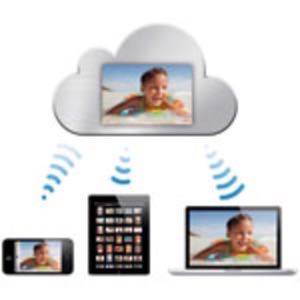Apple’s new iPad goes on sale today. People – already lined up around the world – will likely buy more than a million of them this weekend, and tens of millions this year. And there will be much talk about Apple’s “post-PC” revolution.

But the real key to Apple’s post-PC dreams – slipping past Windows and becoming the dominant consumer electronics platform for the decades ahead – isn’t this new iPad, or any single gadget.
It’s actually iCloud, Apple’s cloud service and storage platform, which doesn’t get the respect and attention it deserves.
Why iCloud?
Because the iPad, without it, isn’t really that much different than the PCs it’s trying to replace. Sure, the iPad is cheaper, prettier, more portable, and touch-controlled. And it runs a less sophisticated operating system than a PC or Mac. But at its essence, it’s a client terminal, the way a Windows PC or Mac is.
What makes the iPad, iPhone, iPod, Apple TV, and gradually, even the Mac, “post-PC” devices, is the idea that they’re all tied together behind the scenes: Your work, your entertainment, your apps, everything. It’s not that they just replace a PC in your home. It’s that they go beyond what a PC ever offered.
That’s where iCloud comes into play.
Today, iCloud mostly just seems like Apple’s proprietary storage and synchronization service. That’s an important start, just as iTunes sync was a critical (and proprietary) Apple tool that helped make the iPod so successful. But it’s also just the beginning. Just as Apple adds new features to its iPads and iPhones, iOS and Mac OS each year, expect new iCloud features as well, designed to gradually move more of your computing life off of individual devices and into the cloud.
The practical benefits? Using multiple devices for the same project. Borrowing friends’ devices for a little work or entertainment. Activating new gadgets and making them “yours” quickly. Sharing iPads. Reducing the required computing and storage resources (and price) of future hardware. And much more that we can’t even dream of.
What does this mean for Apple’s competition? A few takeaways:
If Apple’s campaign is successful – and it’s on the right track – just offering hardware devices to compete with the iPad, iPhone, and Apple TV won’t be enough.
Rivals will not only need competitive hardware, pricing, and app stores, but the cloud-based glue that iCloud presents. And this is not going to be easy, especially for companies whose strength is hardware and not software or cloud services, such as Samsung, Nokia, HTC, etc. (Amazon may actually do okay here, though its interface designs aren’t often pretty. See: Amazon MP3 “cloud locker.”)
In theory, this could be a positive trend for Google, as Google has been focused on cloud-based services forever (Gmail, Google Docs, etc.) and doesn’t have legacy PC baggage. But Google faces an uphill battle of offering its cloud services to a host of hardware partners that have to shoehorn them into hardware designed by different people than the software. It may work, but it’s probably never going to be as elegant as if one company were to make it all. Perhaps that’s why Google is buying Motorola – if it’s smart, it will actually try hard to make great, integrated devices there. It could end up being the best competition for Apple in the long run, or maybe not.
Microsoft will need an iCloud answer, too, for Windows 8 devices. Adding complexity there is that Microsoft plans two different user interfaces for Windows 8: The simple, “Metro” UI that you’ve seen on Windows phones and the new Xbox interface, and the old-style Windows look.
But if the cloud/sync service is designed the right way, that won’t make a difference. Just as iCloud needs to be able to connect iPhones to Macs to TVs, Microsoft’s service might as well be able to connect a Windows workstation to a fancy watch. This old-vs.-new hurdle actually makes a sync service like iCloud even more potentially useful, if it can bring the two Windows together in a clever and useful way. (Then there is the separate issue of whether consumer Microsoft customers and “enterprise” customers should use the same or different cloud services.)
Lastly, this could improve the fortunes for Dropbox, the leading cloud storage and sync startup. What Dropbox does is different than what iCloud does, but it offers a wonderful service, well-known brand, and a good reputation. Imagine Dropbox as a core feature of Android or Windows, expanded to include more services. It could happen. (Or, Dropbox could forge ahead and maybe even become one of the big platform companies over time. Who knows.) Also: Box, the other big cloud storage startup.
So, enjoy your new iPad this weekend. Drool over a potential Apple television set if you must. But the real thing to watch is iCloud. It will play a big role in Apple’s ultimate success or failure in the post-PC era.

















